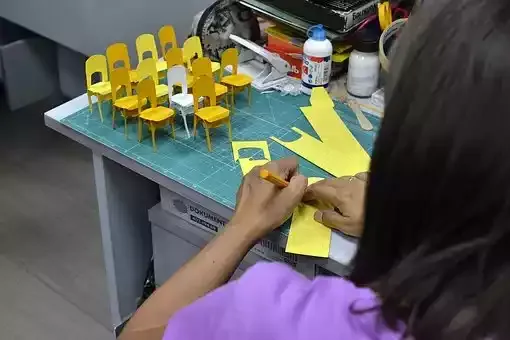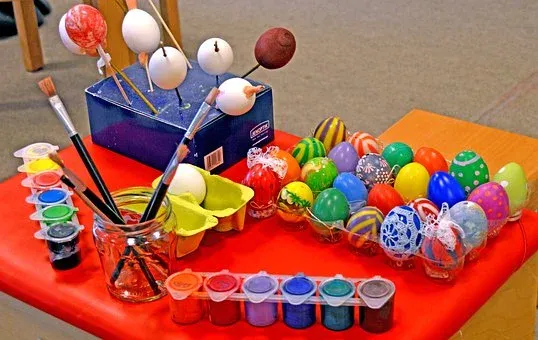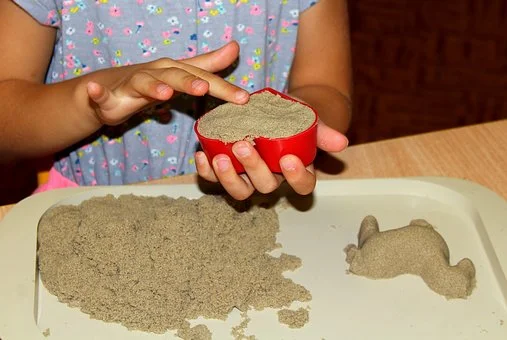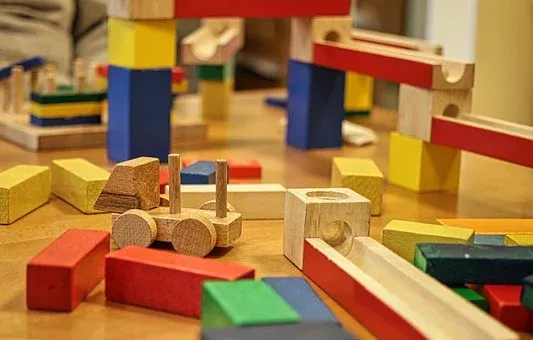Every child has creativity and the development of human creativity begins in early childhood. Early childhood and school-age are important periods to cultivate and develop children's creativity because this is the period when children are eager to actively create and discover.
The foundation laid at this time may affect the whole process of life development. This is not only an important period of intellectual development but also an important period of personality formation and development.
To cultivate and develop children's creativity, parents or teachers should pay attention to the following aspects:
1. Create a sensitive environment for children.
The sensitive environment refers to the environment
in which children can easily be influenced by various imperceptible influences.
In such an environment, children can have a variety of opportunities to be
stimulated, as well as various forms of opportunities to explore and try. For a family, parents should prepare a
variety of materials for their children, that do not have to be expensive.
Now
many parents don't know what kind of psychology they are in. They like to buy
many high-end things (including high-end toys and learning tools) for their children.
It seems that only in this way can parents show their love for their children.
In fact, this is not necessarily good for the development of children, nor conducive to the healthy development of children. In fact, some old magazines, books, old things, old clocks and watches, old appliances, and old furniture may be more conducive to children's creativity.
In fact, this is not necessarily good for the development of children, nor conducive to the healthy development of children. In fact, some old magazines, books, old things, old clocks and watches, old appliances, and old furniture may be more conducive to children's creativity.
Parents should also pay attention to
providing their children with the necessary space for activities. Provide a space
for children to read and explore freely. We should also pay attention to
providing children with opportunities for performance so that children's labor
achievements can be displayed.
Children's thoughts and behaviors should always
be positively reflected by their parents. Encouragement, support, and
appreciation from parents, or Parents' useful suggestions and help are
essential for children to actively engage in creative activities.
For school, we should create a more relaxed
and active atmosphere. In such a relaxed environment, teachers are ready to
answer all kinds of questions from children at any time.
Children have all kinds of opportunities for creative activities, emphasize the acceptance of knowledge, and pay attention to the application and practice of knowledge, and test results are not the only criteria for evaluating learning effects.
Children have all kinds of opportunities for creative activities, emphasize the acceptance of knowledge, and pay attention to the application and practice of knowledge, and test results are not the only criteria for evaluating learning effects.
2. Encourage children to operate independently.
Try to let children do what they can and
achieve certain results. It's very important for children to experience that
it's important to complete the activity independently. A person without a sense of
responsibility can't do anything well, let alone create and invent.
Things are neither big nor small, nor good or
bad so children can do it, and gradually cultivate their sense of
responsibility. Responsibility is the basic component of children's maturity
and creative orientation. It is found that with the development of children's
abilities, their creative ability is more active and spontaneous.
In order to encourage and develop children's
ability to operate independently, parents or teachers can establish an
integrated "achievement register" for children, recording all the
things completed by children themselves in a certain period of time. Don't
think too much about whether your child is doing well, that is, don't put too
much emphasis on quality.
Even things that are not well done or even badly done
should be recorded, but no criticism should be made. This record will become a
complete record of children's creative attempts. It can not only help parents
and teachers to check and identify the active period and conditions of
children's creative activities but also enable parents and teachers to better
understand children and help them to better play with their creativity.
3. Pay attention to emotional support for children.
We stress that children should be
emotionally involved. The emotional engagement here doesn't mean loving
children. It can be said that there are no parents who do not love their
children and no teachers who do not love their students. As parents and
teachers, if they want to train their children to be highly creative talents,
they should have such a sense that they can "waste" precious time on
seemingly meaningless or so-called "little play".
Sometimes children have some good ideas, and sometimes these ideas are often unexpected to our adults. Therefore, some ideas
or practices of children cannot be denied or opposed because they do not meet
their own ideas for a while. Parents or parents should spend more time thinking
about children's ideas and try to find unique and ingenious points in
children's ideas or practices. We should pay more attention to and evaluate any
unique and ingenious idea of children.
When parents don't always impose their
will on their children, don't always want their children to listen to their own
words, and ignore their children's words. Children should be given the
opportunity to express their opinions. They should listen carefully to their
ideas, make positive comments on their creative ideas, show interest in their
creative results, praise them or give their own suggestions, and often pay
attention to their unique features in daily behaviors.
In order to get timely feedback, educators
need to prepare a recording book for themselves, recording the situation of
listening to children express their ideas or activities with children or
participating in children's creative activities at any time, and recording
their reactions to children's narration at that time, such as expressing approval,
opposition or suggestions.
The continuous increase in listening records shows
that you are really concerned about the growth of your children, on the other
hand, it also helps you to accumulate first-hand information about the growth
of your children.
4. Children should be expected and allowed to regress as they grow up.
Encourage children
to admit mistakes rather than hide them. Of course, let children learn from
mistakes or failures. Life is not always calm, and the road to life is not
smooth.
We must remind children that there will be
setbacks and failures in life, work, and study. If possible, we should let
children experience setbacks and failures. Children should realize the fact
that failure and frustration are common. With such mental preparation, when
encountering setbacks or failures, you won't be overwhelmed by anxiety or
mental pressure.
As educators, we should fully understand
children, just like we hope others can understand ourselves, we should allow
children to have a "hundred-day dream" and allow children to have a
"lost soul" phenomenon. In fact, when you find that children are
daydreaming, or in a trance, they may be actively using their imaginations and
thinking about important issues.
American psychologist Avino once said that
the educator must be able to accept and be alert to the plateau phenomenon in
the process of children's growth, that is, the so-called pause phenomenon.
During this period, children sometimes look tired, or there will be a variety
of complaints or show regular boredom. You know, it's natural. There is no
need for parents or teachers to worry about this, let alone blame their
children for their lack of progress.
In fact, we can't expect all the actions of a
child to be logical or desirable, let alone creative. Developing children's
creative potential does not mean that children are not allowed to have
shortcomings, but also should be allowed to have mistakes or shortcomings.
Educators should not resent children's shortcomings or mistakes, but should Often
discuss these shortcomings and mistakes with children. Try to make them realize
the truth, and then give them the opportunity to correct or overcome them.
5. Help children deal with relationships with others and their own independence.
Independence doesn't mean no contact with people. Good independence doesn't
mean no need for friendship. In children's life-long development, social
development is always very important. The independence of a person is
important, but even for very young children, it is very necessary to
communicate with others. Moreover, judging from the trend of social
development, it is almost impossible to accomplish anything without
cooperation.
From the perspective of individual
development, in communication, children can not only communicate, influence, and
promote each other at the same or similar cognitive level, but also for each
child, this is a very rare opportunity to express themselves, and it is also an
opportunity for people to evaluate.
The research shows that whether there is an
opportunity for their products to be recognized by society is an important aspect of the development of creativity. Many people with high creative ability
are not recognized at last, and their talents are buried at last, just because
there is no opportunity to perform and social evaluation. Therefore, many
theorists emphasize that the social value of creative products is the last link
that products show to society.
6. Help children to establish clear training and behavior standards.
Children should
have no doubt about the right and wrong standards of parents or teachers. In
other words, for children, educators should have absolute qualifications to
judge.
However, many of our adults make the wrong use of their absolute rights
and make the wrong mistakes in the process of cultivating children. Educators
with absolute authority should not change the right and wrong standards in
their behaviors. This requires teachers or parents to be ready to admit and
correct their shortcomings in an appropriate way.
The rules in the training must be clear and
implemented firmly. Too many rules will make children too disciplined and
restrain their creativity. This requires attention to the necessary principled
content when establishing rules. For example, there should be no harmful
behavior, no destructive behavior, etc. as for specific details such as how to
play games, the educators cannot stipulate at all.
*** Please Share These Resources with Colleagues, Friends, and Family ***







